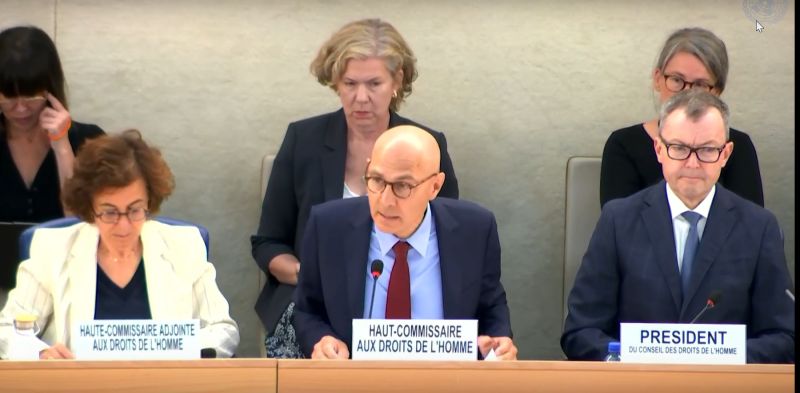Landmark Recognition for CDWD at UN Human Rights Council
In a historic development for global human rights, the 59th Session of the United Nations Human Rights Council opened with a powerful statement of solidarity and recognition for Communities Discriminated on Work and Descent (CDWD), commonly affected by caste-like systems of exclusion, marginalization, and inherited inequality.
During his global human rights update at the opening session, United Nations High Commissioner for Human Rights Volker Türk spotlighted a major breakthrough: the African Commission on Human and Peoples' Rights' adoption of Resolution 619 on Discrimination Based on Work and Descent. The resolution passed during the Commission's 81st Ordinary Session held from 17 October to 6 November 2024 in Banjul, The Gambia, was hailed by Türk as a “global milestone for equality.”
This marks the first time the African Commission on Human and Peoples' Rights has formally acknowledged caste-based and descent-based discrimination as a distinct and widespread human rights violation within the continent.
It signals a turning point in international advocacy for descent communities—groups long subjected to discrimination, exclusion, and forms of modern slavery because of inherited social status and occupation.
The High Commissioner's reference at such a high-level UN forum is particularly significant. It affirms growing international consensus on the urgent need to address discrimination based on work and descent, which affects over 270 million globally—not just in South Asia, where caste-based inequality is well-documented, but also across Africa, Europe and Latin America where similar practices remain under-acknowledged.
For descent communities and their allies, this was a rare moment of global visibility. It was a signal that decades of grassroots organising, documentation, and advocacy were beginning to shift the international narrative. It also reinforced the call for governments to move from denial to action—backed by legal reforms, inclusive policies, and institutional accountability.
The adoption of Resolution 619 itself is a landmark step forward. The African Commission's language is unambiguous. The resolution acknowledges that discrimination based on work and descent—including caste hierarchies, untouchability, traditional and modern forms of slavery, and inherited social status—is a serious and persistent form of social origin discrimination, explicitly prohibited under the African Charter on Human and Peoples' Rights.
The resolution draws on key articles of the Charter, including Article 2 (prohibiting all forms of discrimination) and Article 5 (guaranteeing dignity and prohibiting exploitation and degrading treatment). It expresses alarm at the persistence of such discriminatory practices despite constitutional guarantees and human rights treaties in force for nearly four decades.
Importantly, the resolution recognizes that affected communities share characteristics with minorities under the African Charter. It notes their systemic exclusion and the failure of existing frameworks to adequately address their concerns. In a bid to fill this gap, the Commission has mandated a comprehensive continental study on the scope, causes, and impact of work and descent-based discrimination.
This study will be conducted with the active participation of CDWD communities, and its findings are to be shared with African Union bodies and State Parties.
Resolution 619 also sets a clear course of action for African governments. It calls upon States Parties to formally acknowledge the existence of this form of discrimination and to adopt legislative, institutional, and policy measures for its elimination. This includes disaggregated data collection and closer collaboration with national human rights institutions, civil society organizations, and human rights defenders from affected communities.
Further, it urges traditional and religious leaders to challenge harmful cultural practices and support the eradication of work and descent-based discrimination. The resolution also appeals to all stakeholders to support the mandate of the African Commission's Working Group on Indigenous Populations/Communities and Minorities in Africa, under which CDWD are now explicitly included.
Together, the UN High Commissioner's recognition and the African Commission's resolution represent a rare convergence of global and regional action. They elevate the struggle of historically marginalized communities into the mainstream of international human rights discourse and policy. For the millions across the Africa and globe who have long lived with the invisible chains of descent-based discrimination, this moment is not just symbolic—it is foundational. It opens new pathways for justice, dignity, and full citizenship in the 21st century.
Also Read: No Consent, No Childhood: Forced Conversions and the Collapse of Minority Rights in Pakistan


